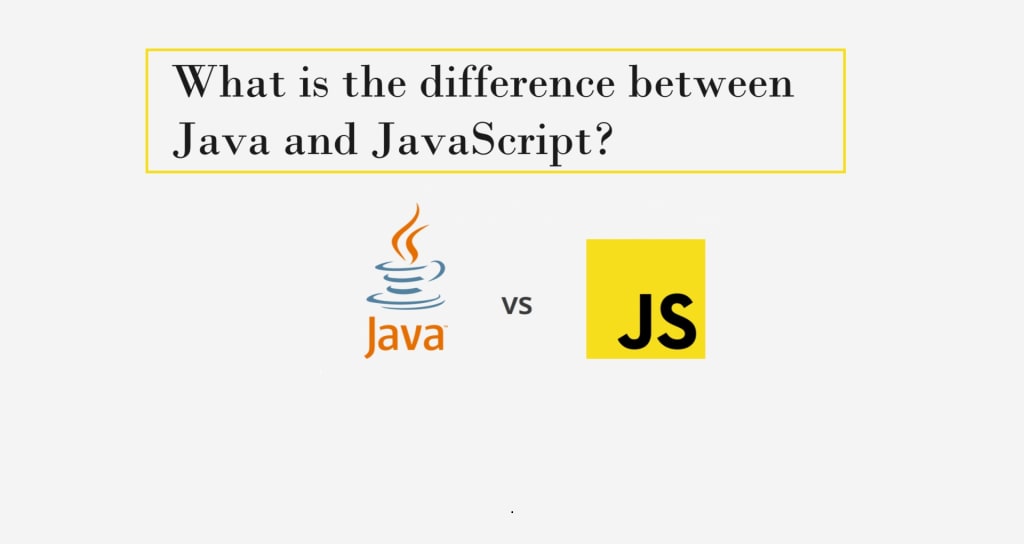JavaScript vs. Java: Unraveling the Confusion
Explore the distinctions between JavaScript and Java

JavaScript and Java, despite their similar names, are two distinct programming languages with separate use cases and ecosystems. This article aims to clarify the differences between JavaScript and Java, helping you choose the right language for your specific needs.
1. Origin and History
JavaScript: JavaScript was developed by Netscape in the mid-1990s as a client-side scripting language for web browsers. It was initially called LiveScript but was later renamed to JavaScript.
Java: Java, on the other hand, was created by James Gosling at Sun Microsystems in the mid-1990s. It was designed as a general-purpose, object-oriented programming language.
2. Purpose
JavaScript: JavaScript is mainly used for front-end web development. It runs in web browsers and is responsible for adding interactivity to web pages, handling user events, and making asynchronous requests to web servers.
Java: Java is a versatile language used in various domains, including web development (with Java web frameworks like JavaServer Faces), mobile app development (Android), desktop applications, enterprise software, and more.
3. Execution Environment
JavaScript: JavaScript is executed in web browsers. It can interact with the Document Object Model (DOM) to manipulate web page elements and provide a dynamic user experience.
Java: Java code is compiled into bytecode and executed on the Java Virtual Machine (JVM). This allows Java applications to run on different platforms, making it a platform-independent language.
4. Type System
JavaScript: JavaScript is dynamically typed, meaning variable types are determined at runtime. It is loosely typed, allowing for flexible variable assignments.
Java: Java is statically typed, requiring you to declare the data type of variables during compilation. It enforces strict type rules.
5. Syntax and Language Features
JavaScript: JavaScript has a C-style syntax. It's known for prototypal inheritance, functions as first-class objects, and support for closures. It also excels at asynchronous programming with features like callbacks and Promises.
Java: Java's syntax is similar to C and C++. It uses class-based inheritance and is renowned for its multi-threading capabilities, making it suitable for concurrent programming.
6. Ecosystem and Community
JavaScript: JavaScript has a vast and active open-source community. It boasts numerous libraries and frameworks like React, Angular, and Vue.js for front-end development. It is also used for server-side development with Node.js.
Java: Java has a mature ecosystem with rich libraries and frameworks for various applications. It is widely adopted in enterprise software development.
7. Performance
JavaScript: JavaScript performance can vary depending on the browser and hardware. Modern JavaScript engines have greatly improved performance, but it's primarily an interpreted language.
Java: Java applications, when compiled to bytecode and run on the JVM, provide robust performance. It's optimized for server-side and enterprise applications.
8. Mobile Development
JavaScript: JavaScript is frequently used for mobile app development through frameworks like React Native and Apache Cordova, enabling developers to create cross-platform apps.
Java: Java is the primary language for native Android app development. Although Kotlin has gained popularity as an alternative, Java remains a key player in the Android ecosystem.
JavaScript and Java, despite their confusingly similar names, serve distinct purposes in the world of programming. JavaScript is the language of the web, enhancing user experiences in browsers, while Java is a versatile language used in a wide array of applications, from mobile to enterprise software. Understanding their differences is key to choosing the right tool for the job in your programming journey.
Hiring JavaScript developers and hiring Java developers involves distinct considerations and requirements, as the two roles cater to different programming languages and domains. Below, I'll outline some key differences and factors to consider when hiring developers for each language:
Hiring JavaScript Developers:
1. Web Development Focus:
JavaScript developers primarily work in web development, creating interactive and dynamic user interfaces for websites and web applications.
2. Front-End vs. Full-Stack:
JavaScript developers can be specialized in front-end development (working with client-side code and user interfaces) or full-stack development (which includes back-end server-side development as well).
3. Popular Frameworks and Libraries:
JavaScript developers often have expertise in popular libraries and frameworks such as React, Angular, or Vue.js for front-end development, and Node.js for server-side development.
4. Versatility:
JavaScript is a versatile language used for both client-side and server-side programming. Developers may have different specializations and skill sets within the JavaScript ecosystem.
5. Real-Time Applications:
JavaScript is commonly used for building real-time applications and web-based games.
6. JavaScript Versions:
Familiarity with various ECMAScript versions (ES6, ES7, ES8, etc.) is important for staying up-to-date with modern JavaScript practices.
Hiring Java Developers:
1. Versatility:
Java developers are versatile and can work on various types of projects, including web development, mobile app development, desktop applications, and large-scale enterprise software.
2. Android Development:
Java is the primary language for Android app development, so Java developers are essential for building Android apps.
3. Enterprise Solutions:
Java is commonly used in enterprise environments to create robust and scalable software solutions.
4. Strongly Typed Language:
Java is a strongly typed language, and developers must declare variable types, which can help catch type-related errors at compile time.
5. Back-End Development:
Many Java developers specialize in back-end development using frameworks like Spring, which is popular for building server-side applications.
6. Performance-Critical Applications:
Java is often chosen for performance-critical applications due to its efficient memory management and runtime environment.
Factors to Consider When Hiring Both:
1. Project Requirements:
Consider the specific needs of your project. Are you building a web application, mobile app, or enterprise software? Your choice of developers will depend on the project's nature.
2. Skillset and Experience:
Review the developers' skill sets and experience. For JavaScript developers, assess their proficiency with relevant frameworks, while for Java developers, consider their expertise in Java frameworks and tools like Spring or Hibernate.
3. Team Composition:
The composition of your development team may vary depending on the project's requirements. You may need a combination of JavaScript and Java developers for a full-stack web application, for example.
4. Compatibility:
Ensure that the developers' skills and experience align with your technology stack and project goals.
5. Communication and Collaboration:
Assess developers' communication skills and their ability to collaborate effectively within your development team.
Ultimately, the choice between hiring JavaScript or Java developers will depend on your project's scope and specific requirements. It's also essential to consider the long-term goals of your project and whether you need expertise in other areas, such as front-end design or database management, to complement the development process.
About the Creator
Nikhil Singh
A passionate tech enthusiast and occasional writer, fueled by an insatiable curiosity for the world of technology. With a deep-rooted love for all things tech.
Enjoyed the story? Support the Creator.
Subscribe for free to receive all their stories in your feed. You could also pledge your support or give them a one-off tip, letting them know you appreciate their work.






Comments
There are no comments for this story
Be the first to respond and start the conversation.